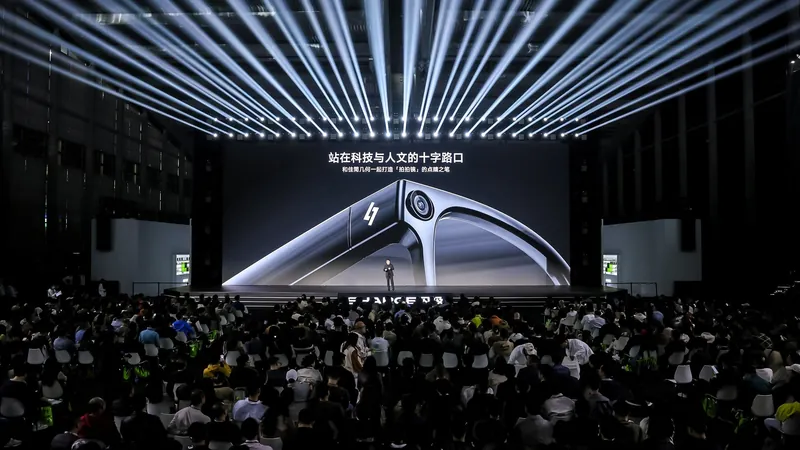
The Future of AI Glasses: Sharge Disrupts the Market with Affordable Innovation
2025-01-06
Author: Nur
Imagine this: you’re at an electrifying concert, completely lost in the music, waving a glow stick as your favorite artist takes the stage. You wish to capture this unforgettable moment, so you simply tap your glasses. Instantly and effortlessly, the gadget starts recording your experience, all without the hassle of pulling out your phone.
What was once a scenario confined to the realms of science fiction is now a tangible reality, courtesy of revolutionary artificial intelligence-powered glasses. These AI glasses have quickly become a standout product within the smart wearable market, merging cutting-edge technology with everyday functionality.
Over the past year, AI glasses have skyrocketed in both complexity and accessibility. A recent report by WellsennXR revealed that by May 2024, the Ray-Ban Meta smart glasses had sold nearly 2 million units, showcasing strong consumer interest. The competition is intensifying, with Chinese tech giants such as Baidu and Xiaomi preparing to launch their own variations in the near future. Baidu’s upcoming "Xiaodu AI Glasses" are set to debut in 2025, harnessing the capabilities of a large language model, while Xiaomi has teamed up with GoerTek to unveil its smart eyewear shortly thereafter.
Unlike traditional eyewear, today's AI glasses are stylish, portable, and seamlessly integrate into the fabric of daily routines, offering new forms of interaction and utility. They come in two varieties: AI-native, which are designed with AI capabilities at their core, and AI-enhanced eyewear like Ray-Ban Meta, which allows existing glasses to incorporate advanced functionalities.
Most current offerings in the market are priced between RMB 2,000 and 4,000 (approximately USD 280-560), with high-end augmented reality models exceeding this range. However, Sharge Technology has recently shaken up the market with the launch of its Sharge A1 glasses, introducing an innovative model priced at just RMB 999 (around USD 140). This budget-friendly option resembles the aesthetics of higher-end models while offering functionalities like smart speaking, voice recording, and action camera capabilities.
Within only one day of its crowdfunding campaign, all 50,000 units of the Sharge A1 were sold, signaling tremendous interest and demand. Looking ahead, Sharge aims to sell 500,000 units in its first year to break even, projecting revenues of RMB 600 million (USD 84 million). The company is ramping up production to meet consumer needs and plans to diversify its product range with additional sunglasses and clear-lens options.
The year 2025 is tipped to be a pivotal one for the AI glasses sector, as competition heats up and companies vie for market share. Sharge's aggressive pricing – half that of its competitors – signals the potential for an imminent price war that could reshape the landscape of wearable technology.
Sharge’s innovation focuses on AI-enhanced memory for everyday users, catering to those who wish to capture life’s special moments—be it family gatherings or a day out with friends—without overwhelming technical features. Founder Zhang Bo emphasizes, "Our goal is to enable directive AI memory—capturing only what users want to remember."
The A1's standout feature is its superior photography capabilities, equipped with a Sony 16-megapixel camera and a 123-degree ultrawide-angle lens, allowing users to take high-quality images while minimizing power consumption through image stabilization technology. For audio enthusiasts, the glasses are outfitted with Hi-Fi speakers and dual digital signal processing (DSP) amplifiers for unparalleled sound quality.
At the heart of the Sharge A1 is its proprietary Loomo OS, which manages multimedia content including voice, text, and images effectively, ensuring smooth synchronization with devices. Drawing from its expertise in energy solutions, Sharge has integrated a robust battery pack that can extend usage time significantly while enabling reverse charging for other devices.
In a strategic partnership with eyewear brand Loho, Sharge has enhanced the A1’s practicality and comfort. By utilizing lightweight resin frames that weigh just 30 grams, comparable to traditional eyeglasses, the Sharge A1 avoids discomfort. Moreover, with Loho's extensive retail presence across China, potential customers can experience the product firsthand, gaining knowledge and support in their decision-making.
Despite the initial limited lens options, Sharge plans to expand its offerings by 2026, tailoring glasses to fit specific prescriptions as production ramps up. Retail versions of the A1 will be priced at RMB 1,499 (USD 210), while early crowdfunding backers can enjoy the RMB 999 price tag. An annual subscription for AI and cloud services will also be available, with the first year complimentary.
Market projections indicate that the smart glasses industry could surge to RMB 106.78 billion (USD 15 billion) by 2029 with a CAGR of 18.56%, although the AI glasses segment is still in its infancy. Zhang compares the emerging landscape to the early days of the iPhone, suggesting that Sharge has the potential to become a frontrunner in this transformative market.
Since its fundraising efforts began, Sharge has raised over RMB 100 million (USD 14 million), attracting investments from prominent venture capital firms. By rapidly launching a market-ready product, Sharge differentiates itself from competitors still in developmental stages, positioning itself as a strong contender in the evolving AI glasses arena.
However, as industry titans enter the market with their innovations, further price drops are inevitable, challenging mid-sized players like Sharge. The journey ahead is fraught with competitive pressures, and only time will reveal whether Sharge can rise above these challenges and establish itself as a lasting entity in the burgeoning world of AI glasses.


 Brasil (PT)
Brasil (PT)
 Canada (EN)
Canada (EN)
 Chile (ES)
Chile (ES)
 Česko (CS)
Česko (CS)
 대한민국 (KO)
대한민국 (KO)
 España (ES)
España (ES)
 France (FR)
France (FR)
 Hong Kong (EN)
Hong Kong (EN)
 Italia (IT)
Italia (IT)
 日本 (JA)
日本 (JA)
 Magyarország (HU)
Magyarország (HU)
 Norge (NO)
Norge (NO)
 Polska (PL)
Polska (PL)
 Schweiz (DE)
Schweiz (DE)
 Singapore (EN)
Singapore (EN)
 Sverige (SV)
Sverige (SV)
 Suomi (FI)
Suomi (FI)
 Türkiye (TR)
Türkiye (TR)
 الإمارات العربية المتحدة (AR)
الإمارات العربية المتحدة (AR)